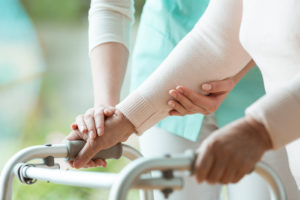Hip replacement surgery: 6 things to expect if you are a caregiver

I’ll come right out and say it: taking care of someone after hip replacement surgery is challenging. This is a major surgery with a long recovery time.
As a caregiver, your role will be essential in the recovery process. There are medications to track, personal care tasks to assist with, and therapy exercises to perform. If you aren’t prepared for what’s to come, it can be daunting.
Hip replacement surgery: 6 things to expect if you are a caregiver
To help prepare you for the recovery process, here are six things to expect. Take time to think through them now so you aren’t trying to do everything all at once after the surgery.
1. The house will need some modifications
Before surgery day, take some time to prepare the house for your loved one’s return. They will likely be using a walker or crutches, so keep your eyes peeled for potential hazards. Look for:
- Cords running across the floor
- Rugs with loose corners
- Narrow pathways between furniture
- Slippery floors
- Commonly used items stored down low or up high
- Showers you have to step high to get into
- Stairs
Do what you can to fix these problems before surgery. Tack down the rugs, move the furniture, pick up some non-skid material for the slippery floor. Install arm rails to help get into the tub. Set up a recovery area on the main floor, close to a bathroom or temporary toilet to avoid stairs.
2. You will learn a lot at the hospital
Plan on being in the hospital with your loved one as much as possible. You want to meet with the doctors, nurses, and physical therapists to learn all that you can. Take time to listen and ask questions. Read all the documents you are given carefully.
You want to know:
- The medication schedules
- What symptoms indicate a problem
- The recovery timeline
- How to help your loved one with daily tasks
- How often to change the dressing
- When showering can resume
- Any complications that can occur
Think through your questions and make a list so you have them all in one place. You can always call the doctor’s office after surgery, but you do want to learn as much as you can while your loved one in still in the hospital.
3. Your loved one will be in pain
Pain management is a critical part of care-taking after a major surgery. Your loved one will be in pain. Keep track of pain medication and give it each time it’s due for the first couple of days. Keeping on top of the pain now will help the recovery go more smoothly.
Once physical therapy begins, try to give pain medication about half an hour before the appointment. That way it’s kicked in before the therapy session.
In addition to medication, you can use hot and cold therapy to help minimize pain. Remember not to use ice for more than twenty minutes at a time.
4. You may need to encourage your loved one to move
Moving helps speed up the recovery process. Sometimes people need gentle reminders to move. Encourage your loved one to change positions every 45 minutes or so.
Help them do the exercises their physical therapist recommends. Be firm but loving. Help them to see that you are doing this to help them recover.
5. Lots of care will be needed at first
After the surgery, your loved one will need a lot of help. They will need help bathing, cooking, and maneuvering through the house. There will be dressings to change and oozing to watch for.
The first few days at home are the worst. There will likely be tears from both of you as you learn how to work together. Once you’ve made it through the first week, things typically get easier as you fall into a routine of sorts.
If you find the care is too much for you, considering getting an at-home aide or inquiring about a rehabilitation center.
6. Your loved one may have emotional struggles
Feeling helpless or worthless is a common emotional struggle after a major surgery. Your loved one may feel guilty about all the help you have to provide. They may struggle with fear about the surgery and recovery.
Be available to listen and provide encouragement. Reassure your loved one that they will recover and you’ll be there to help.
Do you know someone else preparing for hip replacement surgery? Send this article their way so they can share it with their caregiver.

One comment
Diana
October 18, 2023 at 2:36 pm
Good info HOWEVER, many ppl now have not rightly assessed the home situation.
My 87 parents. With a unkept home and 50’s parents mentality.
Men are not the caregivers. We the daughters are not allowed inside the home, outside caregivers are being processed for the 1st time.
Making a list to help the one who had surgery MUST take into consideration each persons individual need, what help is accepted, what the older person can handle.
When Insurance wants to say you get in home care it’s not 24/7. Never over nite, and many grown children like me have tried many things. Without success. Too many younger care givers nurses do not treat the whole family.
Greater tranining is needed all around